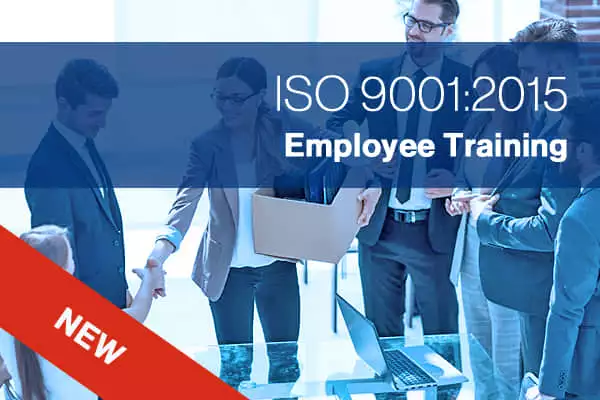

Password


Password
Top searches
August 2023
Training is a very important part of the ISO 9001 implementation process. It encourages employee buy-in, raises awareness of the tasks at hand, and improves competencies. It's also something external auditors will expect to see evidence of when assessing the efficacy of the organization's Quality Management System.
We looked at the three most effective ISO 9001 training solutions:
Online training
Classroom-based courses
On-site ISO 9001 training
Online courses have been growing in popularity ever since they became a mainstream option about 20 years ago. Their benefits are well known: they're generally enjoyable, affordable and flexible. Learners can pause and resume their courses whenever they want, making them ideal for busy professionals and anyone else with a packed schedule.
Some of the nicest online ISO 9001 courses we've come cross include the ones offered by StandardsCourses, a Boston-based company that's been around for well over a decade and specializes in ISO training. One course that grabbed our attention is their Employee Training program, a 1-hour program that costs just 29 USD.

The course is clearly intended as a bulk-purchase option that would be administered to employees either before the company makes a start on its ISO 9001 implementation or sometime shortly thereafter.
The course's stated goals are to deliver a solid understanding of ISO 9001, to generate enthusiasm and buy in, and to motivate staff to contribute effectively to a corporate culture that prizes customer satisfaction and continuous improvement.
You can read more about the ISO 9001 Employee Training course on the StandardsCourses website. With such a low price, it's hard to see why it shouldn't be on the radar of any organization planning to set up an ISO 9001 system.
Classroom-based courses offer a few key strengths that online learning will never be able to trump. Benefits typically include:
Real teachers, real feedback
Nothing compares to having a real teacher who's there to answer whatever questions you might have, whenever you might have them.
A good instructor will also be able to share tips, tricks and anecdotes gained from real-world experience of working with ISO 9001 Quality Management Systems.
Social interaction
A lot of people prefer traditional teaching because of the social opportunities it affords.
Not everyone likes learning alone in front of a computer or smartphone.
As well as the social aspects, classroom-based learning is important to some people in that it gives structure to their lives and helps them focus more on their education.
Resources
Few things beat having access to a good library packed with all the books and periodicals you might need in order to learn more about ISO 9001 or any other ISO management standard.
Several leading organizations used to offer traditional, classroom-based courses, but these days the number is dwindling. The paradigm shift came during Covid and the lockdowns that followed. Training providers were forced to switch to virtual classrooms, and on the whole learners responded enthusiastically.
BSI still offer classroom-based courses, though for the most part they now use what they refer to as a "live online classroom". These courses retain the advantages of having a real teacher who can offer real feedback, but obviate the need for participants to travel.

On-site training can be particularly beneficial as a means of introducing employees to ISO 9001 and motivating them to participate in the company's Quality Management System.
On-site or in-house ISO 9001 training is an expensive solution aimed primarily at the corporate sector. It's easily the best, most effective and most convenient choice for organizations with generous training budgets. Instructors are usually experienced ISO 9001 consultants who have sought additional training as educators.
Possibly the main advantage of on-site training is that it's tailored specifically to the needs of course participants, whether it be a one-to-one course or a program designed for a dozen or more attendees. Training usually includes post-course discussion, question and answer sessions, advice on best practices, and sometimes even recommendations for the organization's ISO 9001 implementation or audit strategies.
On-site training also guarantees a relaxed and familiar environment in which to learn, thereby ensuring that learners get the most from the course and are able to put to use the knowledge they've acquired.
Many ISO 9001 management consultancy firms offer on-site training. Our advice, as always, is to exercise due diligence. Different instructors have different approaches to education: while some educators might excel at promoting theoretical debate and rigorous discussion, it might be the case that what your staff really needs are hard facts, practical tips and guidance.
We've looked at three of the most popular and effective ISO 9001 training options available. Each format has its own distinct pros and cons, and each has a place in a teaching strategy designed to cover all levels of a typical corporate structure. If budget allows, on-site training is definitely the way to go. If not, ISO 9001 online training courses are an excellent option we are happy to recommend.
Recommended ISO 9001 products, consultancy services and training solutions for your organization's needs.
Read more
TOP